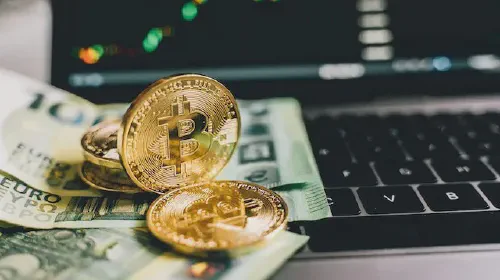Mobile Payment Apps: Types, Security, Popular Apps & Tips
Salomon Kisters
Jun 13, 2023This post may contain affiliate links. If you use these links to buy something we may earn a commission. Thanks!
Mobile payment apps have become increasingly popular in recent years, offering a convenient and quick way to pay for goods and services.
With so many options available, it can be overwhelming to decide which apps to use or how to use them effectively. It’s essential to stay informed and educated to make the most of these apps while keeping your payments and financial information secure.
In this blog post, we will cover everything you need to know about mobile payment apps, from their benefits and drawbacks to their features, security measures, and the most popular apps available in the market.
Whether you are a beginner or an experienced user, this guide will help you navigate the world of mobile payments and make informed decisions.
Different types of mobile payment apps
There are several types of mobile payment apps available in the market, each with its unique features and benefits. Some of the most common types of mobile payment apps include:
1. Bank mobile payment apps
These apps allow users to link their bank accounts and make transactions directly from their smartphones. They are usually provided by banks and offer features such as bill payments, funds transfers, and balance inquiries.
2. E-wallets
E-wallets are mobile apps that allow users to store their debit or credit card information in a virtual wallet. Users can then use their smartphones to make purchases both online and in physical stores.
3. Peer-to-peer payment apps
These apps allow users to send and receive money directly from their smartphones. They are ideal for splitting bills or sending money to friends and family quickly.
4. Payment aggregator apps
Payment aggregator apps allow users to link multiple payment methods, such as credit cards, bank accounts, and e-wallets, in one place. This makes it easier to manage funds and make payments without having to switch between different apps.
It’s important to choose the right type of mobile payment app that best suits your needs and financial goals. Be sure to read the app’s reviews before downloading it and always keep your device and payment information secure.
Security features to look for in mobile payment apps
When it comes to mobile payment apps, security should be your top priority. These apps often involve sensitive financial information, so it’s crucial to choose an app that has strong security measures in place. Here are some security features to look for when choosing a mobile payment app:
1. Two-factor authentication
This security feature involves requiring users to provide two forms of identification before they can access their account. This can include a password and a fingerprint scan, or a password and a one-time code sent to your phone. Two-factor authentication can help prevent unauthorized access to your account.
2. Encryption
Encryption is the process of scrambling data so that it’s unreadable without the correct key. Look for mobile payment apps that use strong encryption to protect your financial information from hackers and cybercriminals.
3. Fraud monitoring
Some mobile payment apps use fraud monitoring to detect and prevent suspicious activity on your account. This can include notifying you when a large transaction is made or when there is unusual account activity.
4. Secure data storage
Mobile payment apps should store your financial information in a secure manner to prevent unauthorized access. Look for apps that use secure servers and encryption to protect your data.
By choosing a mobile payment app that has strong security features, you can help protect your financial information and prevent fraudulent activity. Be sure to research each app before downloading it to ensure that it meets your security standards.
Popular mobile payment apps and how they work
There are numerous mobile payment apps available, ranging from well-known apps like PayPal and Venmo to newer apps like Cash App and Zelle. Here’s a breakdown of some of the most popular mobile payment apps and how they work:
PayPal
PayPal is one of the most well-known mobile payment apps, offering a range of services including online payments, money transfers, and invoicing. To use PayPal, you need to create an account with your personal and financial information and link it to your bank account or credit card. You can then send money and make purchases using your PayPal account.
Venmo
Similar to PayPal, Venmo is a mobile payment app that lets you send and receive money from your phone. One unique feature of Venmo is the social feed, which allows you to see and interact with payments made by your friends. To use Venmo, you need to create an account and link it to your bank account or debit card.
Cash App
Cash App is a newer mobile payment app that has gained popularity in recent years. Like Venmo and PayPal, Cash App lets you send and receive money from your phone. You can also use Cash App to buy and sell Bitcoin. To use Cash App, you need to create an account with your personal and financial information and link it to your bank account or debit card.
Zelle
Zelle is a mobile payment app that’s built into many banking apps, allowing you to send and receive money from your existing bank account. To use Zelle, you need to have a bank account with a participating bank and enroll in Zelle through your banking app. Once enrolled, you can send and receive money from other Zelle users.
Each mobile payment app has its own unique features and requirements, so it’s important to research and compare different apps to find the one that best meets your needs.
Pros and cons of using mobile payment apps
Mobile payment apps have revolutionized the way we handle financial transactions, but like any other technology, they come with their own set of pros and cons. Here are some of the advantages and disadvantages to consider before using a mobile payment app:
Pros:
- Convenience: Mobile payment apps allow you to send and receive money quickly and easily, without the need for cash or checks.
- Security: Most mobile payment apps use encryption and other security measures to protect your financial information.
- Speed: Transactions on mobile payment apps are processed almost instantly, allowing for immediate access to funds.
- Budgeting: Some mobile payment apps allow for tracking of spending, making budgeting and financial planning easier.
Cons:
- Fees: Some mobile payment apps charge fees for certain transactions or for transferring money to a bank account.
- Fraud: While security measures are in place, there is still a risk of fraud or identity theft when using mobile payment apps.
- Limited acceptance: Not all merchants accept mobile payments, so you may still need to carry cash or other forms of payment.
- Technical issues: As with any technology, there may be glitches or technical issues that can cause delays or errors in processing transactions.
When deciding whether to use a mobile payment app, it’s important to weigh these pros and cons and consider your personal financial needs and preferences.
Tips for Safely and Effectively Using Mobile Payment Apps
Mobile payment apps can be very convenient, but it’s important to use them safely to protect your financial information. Here are some tips for using mobile payment apps effectively:
Secure your device: Make sure your phone is protected with a strong password or fingerprint scan to prevent unauthorized access.
Download only reputable apps: Stick to well-known and reputable apps from trusted sources like the Apple App Store or Google Play Store.
Check for security features: Look for apps that have encryption and other security measures in place to protect your personal and financial information.
Use strong passwords: Choose a strong password for your account that includes letters, numbers, and special characters.
Monitor your account: Stay vigilant about monitoring your account for any suspicious activity or unauthorized transactions.
Avoid public Wi-Fi: Don’t use public Wi-Fi to make mobile payments, as these networks can be hacked and your information compromised.
Keep your app and phone updated: Make sure your mobile payment app and phone software are always up-to-date to take advantage of the latest security patches and advancements.
By following these tips, you can effectively use mobile payment apps while keeping your financial information secur
Stay informed with the latest insights in Crypto, Blockchain, and Cyber-Security! Subscribe to our newsletter now to receive exclusive updates, expert analyses, and current developments directly to your inbox. Don't miss the opportunity to expand your knowledge and stay up-to-date.
Love what you're reading? Subscribe for top stories in Crypto, Blockchain, and Cyber-Security. Stay informed with exclusive updates.
Please note that the Content may have been generated with the Help of AI. The editorial content of OriginStamp AG does not constitute a recommendation for investment or purchase advice. In principle, an investment can also lead to a total loss. Therefore, please seek advice before making an investment decision.

Top Blockchain Startups to Watch in 2021 - Innovative Use of Blockchain Technology
Discover the top blockchain startups of 2021 that are innovatively using blockchain technology to reshape various industries.

Understanding the Special Features of Bitcoin: Limited Supply, Decentralized Transactions, Security, and Global Accessibility
Explore the unique features of Bitcoin, including limited supply, decentralized transactions, security, and global accessibility. Learn why Bitcoin is a groundbreaking digital asset.

Protect Your Cryptocurrency: Tips to Prevent Scams and Fraud
Tips to Prevent Scams and Fraud. Learn how to keep your digital assets safe with these essential security measures and best practices.
Protect your documents
Your gateway to unforgeable data. Imprint the authenticity of your information with our blockchain timestamp